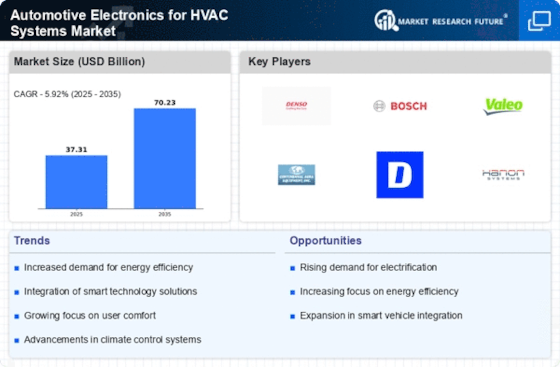Market Analysis
In-depth Analysis of Automotive Electronics for HVAC Systems Market Industry Landscape
The utilization of automotive Heating, Ventilation, and Air Conditioning (HVAC) systems, once perceived as a luxury, has evolved into an indispensable element in modern vehicles. Originally, not all vehicles were equipped with HVAC systems, but evolving international safety and comfort standards have mandated their inclusion in every automotive design. The prominence of automotive HVAC systems stems from their crucial role in vehicle safety and comfort, influencing aspects such as fuel economy, energy efficiency, and overall cost-effectiveness.
The energy consumption of a car is intricately linked to its HVAC system, which draws power from the engine. The quest for improved fuel efficiency has led to the development of lighter and more efficient HVAC systems, making them more affordable in the automotive market. Market expansion in the coming years is anticipated to be fueled by advancements that reduce the size and weight of HVAC systems. As manufacturers invest in Research and Development (R&D), they aim to differentiate their products by creating small, lightweight HVAC systems with integrated electronics, sensors, and automated climate control features. Denso, for instance, has introduced a revolutionary COA HVAC system with a new blower structure, resulting in a 30% reduction in required heat, a 20% decrease in size, and lower power consumption. This innovative approach aligns with the industry's commitment to providing environmentally friendly and energy-efficient HVAC systems. Similarly, the Mahle Group focuses on continuous enhancements in efficiency, weight reduction, minimized pressure loss, and further optimization of HVAC system acoustics.
The affordability of HVAC systems is further propelled by the integration of electronic components and advanced features, making them more widely adopted in passenger automobiles. This strategic approach by manufacturers aims to cater to a broader consumer base seeking cost-effective and energy-efficient solutions.
Beyond the realms of comfort, the automated operation of HVAC systems contributes significantly to travel safety. Modern HVAC systems ensure the safe and clean operation of vehicles, mitigating various travel risk factors. While the current level of temperature comfort in automobiles is substantial, the ongoing advancements in HVAC technology promise even greater comfort in the future. Importantly, automotive air conditioners play a pivotal role in enhancing safety. By maintaining a comfortable and attentive environment for the driver and dehumidifying cabin air to prevent glass fogging, HVAC systems contribute significantly to overall travel safety.
In conclusion, the increased availability of affordable and technologically advanced HVAC systems in the automotive sector is shaping the future of vehicle design. The focus on lightweight, energy-efficient solutions not only enhances fuel economy but also aligns with global efforts toward sustainability. Moreover, the emphasis on safety through the automated operation of HVAC systems underscores their multifaceted role in ensuring a secure and comfortable travel experience. The continued evolution of HVAC technology is poised to drive demand and innovation in the global automotive electronics for HVAC system market.


















Leave a Comment